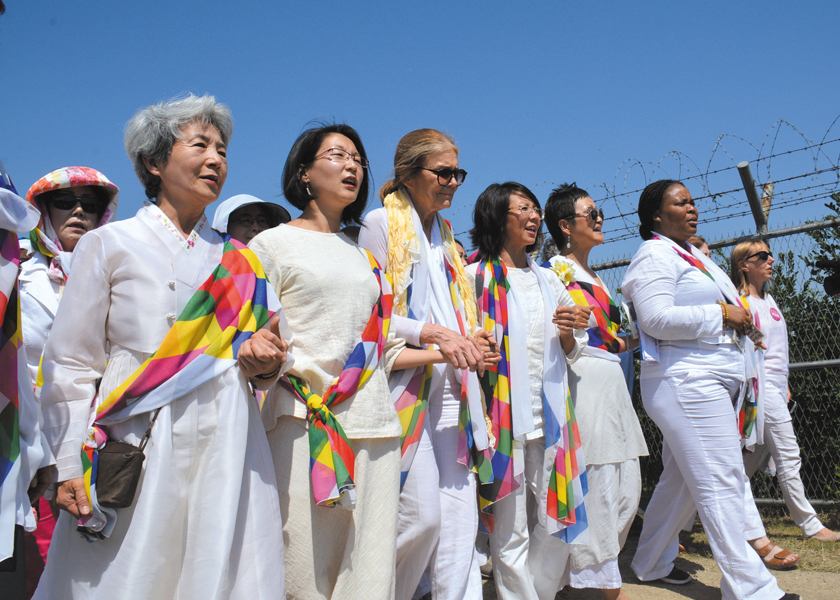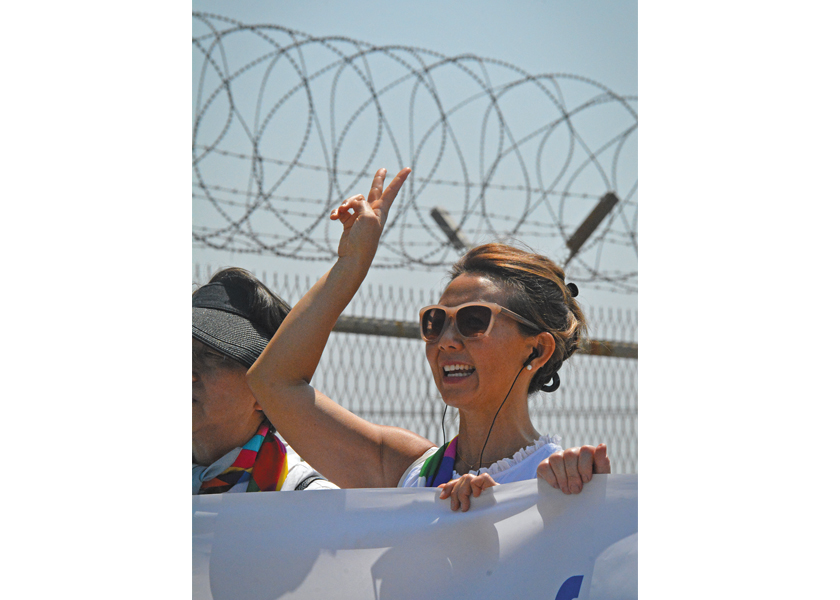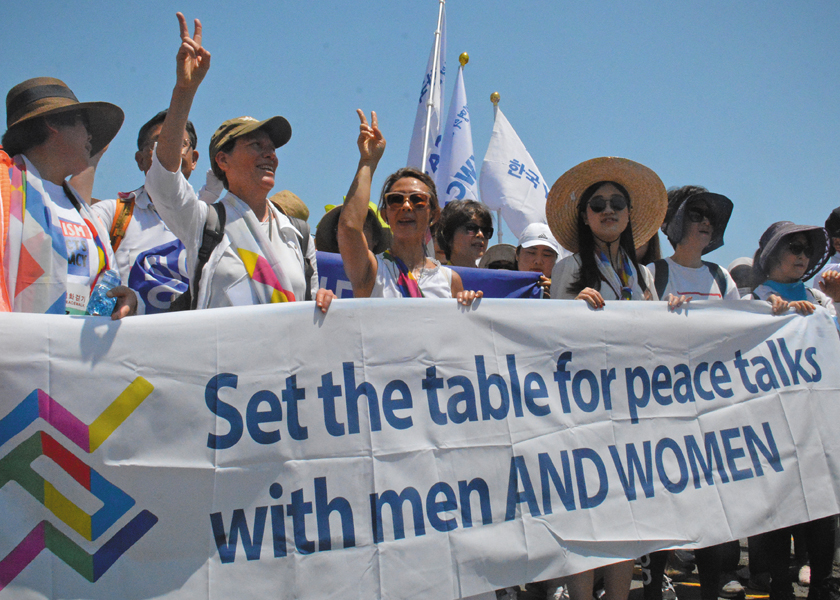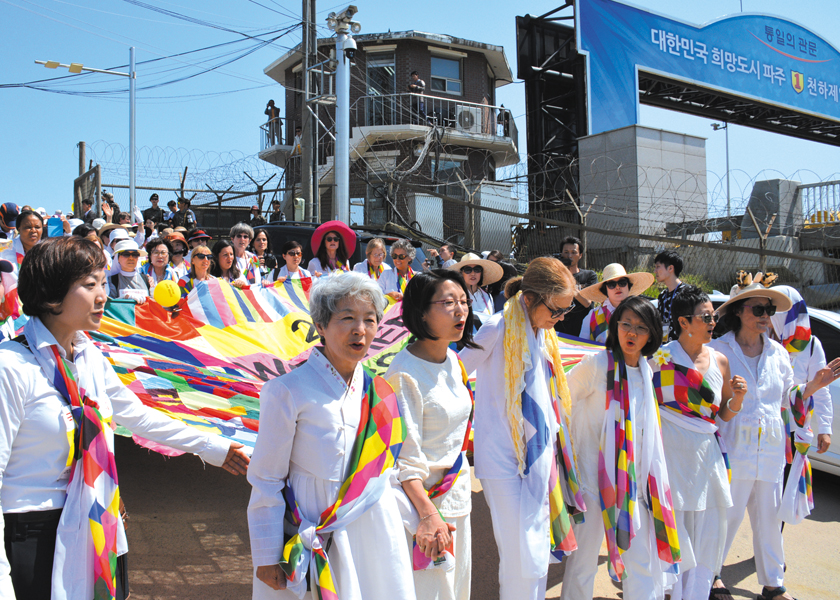Peace activist Christine Ahn talks about dreams, mentors and hope for the long view | By Seth Mountain (Fall 2020 issue)

Christine Ahn is a longtime peace activist who, in 2015, led 29 international peace activist women through her organization WomenCrossDMZ from North Korea to South Korea across the Demilitarized Zone. Since then, she has been working with partners in a global alliance to formally end the Korean War with women’s input as a key ingredient in building peace.
This year, she was awarded the prestigious 2020 U.S. Peace Prize from the Peace Memorial Foundation for her collaborative work to end the Korean War.
After decades of peace activism, advocacy for women’s rights, and anti-colonial writing and speaking, Ahn has become an outspoken activist for a women-led movement directed at peace, and bringing about Korean reunification.
In the early 2000s Ahn worked with Korean farmers during the resistance to relocation and the construction the huge U.S. military base in Pyeongtaek. She was also one of the first activists to spread the story of the naval base resistance movement in the tiny Gangjeong Village on Jeju Island. The news spread to international audiences, through direct action by peace groups, and by her and others publication of widely-read articles in English.
On April 28th, 2019, I interviewed Ahn in Seoul while she was waiting to take part in a country-wide demonstration along the DMZ. The occasion was the one-year anniversary of the Panmunjom Declaration, when South Korean President Jae-in Moon and North Korean leader Jong-un Kim met and promised North and South Koreans they would end the Korean War within a year.
Despite overwhelming popular support in South Korea to end the war, in April 2019, the state of the Korean Peace Process did not look good. A month before, Sen. Nancy Pelosi and then-Secretary of State John Bolton had worked together to derail the Hanoi Summit between Trump and North Korean leader Jong-un Kim.
Leaders on both sides of the summit had discussed at least issuing a joint declaration. Instead, the meeting ended abruptly and coldly, with no deal. For weeks after this meeting the mood among peace activists and many South Koreans in Seoul was one of frustration and heartbreak.
The interview included discussion of the power and importance of women leaders, and the strength that comes from including one’s self in the long view, as a root of hope and strength in the struggle to end the Korean War.

The following are excerpts of our 2019 conversation:
Ahn said she has been an activist her whole adult life. “I think it is the experience of growing up in the U.S. as a working-class immigrant, and seeing the tremendous inequality and the hardship that my parents went through,” she said. “I went to 12 public schools growing up. I moved from home to home. I think I’ve always been fighting for the underdog.”
She remembers a moment in particular, at Georgetown University, where she went to graduate school on a scholarship. “I was in a class at the School of Foreign Service, and a guy named Robert Gallucci came to talk about his moment in the White House, in the Oval Office, when Bill Clinton almost bombed North Korea,” she said. “And that was when Jimmy Carter got on a plane, and he called the White House and said, I’m going to North Korea with a CNN camera crew.”
The White House staff and many of the powerful werereportedly furious with Carter. “But he did the right thing,” Ahn added. “He single-handedly stopped the U.S. from doing a pre-emptive strike on North Korea.”
Ahn remembers most her complete shock at hearing the story, and how “before then, I really didn’t know about Korea. And so, I began my journey.”
Up to this point, Ahn had worked in Jamaica, at the U.S./Mexico border, on the Navajo reservation with the native Dineh. All of those experienced added a piece to her critical view of U.S. empire. Being ignorant about the history of her own homeland pained her, and “Once I started to learn more, I felt I had a responsibility.”
Over time, Ahn said, she learned that advocacy is effective when paired with creative action, something that sparks the imagination. That quality of creative action is at the heart of WomenCrossDMZ. “I love to do the basics, and build movement. But I absolutely love creative action! So I am always trying to think, what is the next creative thing that we can do to inspire civil disobedience, and shake things up?” And protesting with joy? “Then it is super-subversive,” she said.
Ahn has an international policy degree from Georgetown University, but she said, her real education came from being on the ground. “I really owe it to the movements. They taught me. They trained me. And that’s where I will always have my home. I’ve been taught by some really great, amazing activists.”
Her list of mentors is many. There is Linda Burnham who started the Women of Color Resource Center in Oakland, California. “She was very close to Angela Davis, they grew up together in the south where her parents were first generation civil rights organizers,” Ahn said. “Linda is a powerful Black woman, an amazing feminist and third world liberation activist.”
Another mentor is Anuradha Mittal, who Ahn worked for at the food justice organization Food First. Mittal was a leading anti-globalization activist against the World Trade Organization. “She really taught me so much about third world liberation movements as well as some very tangible skills, like the importance of writing op-eds.”
Ahn also names Pablo Eisenberg, founder of Center for Community Change and the National Committee for Responsive Philanthropy, “the oldest U.S. philanthropic watchdog. Pablo really taught me a lot about philanthropy and money, and the way the foundations and the whole non-profit industrial complex works.”
These activists have in common their work against globalization, and also against capitalism and racism, Ahn said. “When I came to Korea, I already had a set of specific skills,” she said, “kind of like a Leatherman.” One of her first observations was “I think we need a think tank,” she said. “We needed Korean American voices that are aggressive and critical, to write and speak on TV! So I helped create the Korea Policy Institute.”
Korean voices needed to be speaking about Korea, instead of just white guys. “How do we own the narrative?” Suddenly, it began to work, she recalled. “It is incredible to me that I’ve had five op-eds in the New York Times without anyone pitching them. It is kind of surreal. I have never been a really good student, it’s just that I truly believe in democracy. I’m a democrat.”
Ahn spent time in Pyeongtaek, marching in solidarity with farmers trying to save their ancestral farmlands from seizure for a huge U.S. military base that was eventually located there. “Farmers had tilled that soil for generations, and then they were completely displaced in the name of U.S. national security,” she said.
And when the Gangjeong struggle came up, she said “I felt like ‘oh my God, we can’t let it happen again! So I went to Gangjeong.” She had been in touch with some of the key activists on the ground prior to going there, and felt she could help. The people of Gangjeong, a tiny village on Jeju Island, protested for many years the planned submarine base that would lay waste to the delicate marine environment of the ocean in that place, and ruin the traditional lifestyle of the people in that rural area.
Ahn remembers being very nauseated there, and discovering she was pregnant. When her daughter was born, she named her Jeju. “Still, I was moved by the resistance, and helped break the first [international English-language] story about Gangjeong. I got it into the New York Times on Saturday.” Her friend and famous women’s activist Gloria Steinem also wrote an op-ed, and hers was accepted for the Sunday New York Times.
Publishing and refusing to stop talking about peace issues made Ahn a target. In 2004, she gave a speech in South Korea, at the Human Rights Commission about North Korean human rights. There was increased criticism that South Korea was not addressing North Korea’s human rights issues. Ahn wrote about how human rights issues are a result of the unresolved Korean War.
The speech was “provocative,” she said, “not provocative to me, but it seemed provocative at the time. Ahn said it was hypocritical for the U.S. to pass human rights legislation and more sanctions when its own soldiers had just committed grave war crimes against political prisoners in Abu Graib prison in Iraq and Guantanamo Bay prison in Cuba, during the Bush administration. “I got a standing ovation!” she said. It was not the brilliant oratory, but the plain truth of the statement that got the audience to their feet.
After the speech, she was targeted by the right. A former military lawyer who had worked in Korea attacked Ahn on his blog. “So he wrote this piece Who is Christine Ahn? The Alternative Reality of Christine Ahn. I was freaked,” she said.
What brought her back to earth, she said, was what she calls the long view. “People have been red-baited, people have been killed, they’ve been silenced and tortured because they believed in a different future for Korea. I’m not saying that I’m impenetrable, or that I can withstand that.”
However, she continued, she sees a responsibility to the truth, and to do what she can. “What I can contribute in my lifetime, I have to do it. I have to do it to advance progress. I have to do it to advance justice. I have to do it to advance the truth.”
She remembers that in a group she was working with Women Dismantling Militarism, they screened a film Pray the Devil Back to Hell, about Liberian women crossing Muslim-Christian lines to end a 17-year conflict. “I was super inspired,” she said. On the same night, she saw an article on her computer about the flooding of the Imjingang river in South Korea. “It’s a river that flows through the heart of Korea. Poems and songs have been written about it.” The flood damage in South Korea happened allegedly because the North Koreans lifted the floodgates without telling their South Korean counterparts. “I remember reading about the flooding, and feeling: ‘Hey? Why can’t these guys just figure it out, and pick up the phone and call each other?’ But the hotline had been cut off between North and South Korea.
That night she had a dream about wading in a peaceful river, upstream, curious and following a light to its source, “And that’s when I came to a circle of women. And they were stirring something that they then poured into little vessels, which then became the light that flowed down the river. And that’s when I woke up and I said, “I know who will end the war. It will be women that end this war.”

Working on her vision, she began to puzzle out the “how” of women ending the war. “So I got a fellowship at the University of Michigan. I asked my friend and sunbae (older classmate) Hye-Jung Park to help me do some oral history research. How have women been building peace across the DMZ?” She learned there had been an effort involving North and South Korean women which was organized by a Japanese woman, in 1991. The group met in Tokyo, Pyongyang and Seoul.
In 2013, she said, “I saw five kiwis drive their motorbikes across the DMZ. I contacted them. I said, tell me how you did it. If they can do it, women calling for peace can certainly do it.” (note: “kiwi” is slang for a New Zealander). Ahn worked with an official assigned to the DPRK Permanent Mission to the UN, Chol Pak. “He had extensive experience engaging with civil society groups from around the world,” she said. She remembers saying something like “the Universe provides!” to which he replied “That’s a crazy idea, but write a proposal to Pyongyang.” She did write, received an invitation from Pyongyang to go and pitch the idea. “I decided at the 11th hour to bring my daughter Jeju,” who was much photographed and adored by the North Koreans during her trip.
The long view is often the hard view, Ahn reflected. “But it’s what gives us sustenance to keep going. To know that it’s a long road, but it just keeps getting better. But frankly, I’m nervous. Because I don’t know if we’re going to have this opportunity in another generation.”
The long view, however, also tells Ahn that the U.S. is changing, mainly because of grassroots movements that have been gathering strength over a long time. “I feel like we are seeing, for the first time in generations, real discussions about U.S. foreign policy on a large and public scale.” Another hopeful sign, she said, was in 2018, “to have the most diverse U.S. Congress fueled and swept into power by grassroots movements. And a lot of it is led and organized by women. In the wake of the Trump administration [came] the election, and the women’s marches, and the #MeToo movement.”
Ahn said she finds the newer members of Congress to be people she can work with, especially the women. “Rashida Tlaib is the first Palestinian-American Congress-woman and understands the critical role U.S. foreign policy plays in supporting Israel’s subjugation of Palestine. Alexandria Ocasio-Cortez, who is Puerto Rican, understands the history of U.S. colonization of Puerto Rico. Ilhan Omar, as a refugee, understands how U.S. militarism in the Middle East has impacted the lives of millions of people fleeing war and violence.”
That women like these are shaping our country’s future direction “give me so much hope,” Ahn remarked. “Despite their incredibly difficult life struggles, they maintained a connection to their communities, and they are challenging what the U.S. can be and what it stands for. And we must stop the U.S. empire in its multiple manifestations. It’s going to take collective energy, tremendous belief and vision and hope. But we’re seeing it.”
Trump grabbed the spotlight when it came to discussing a peace deal with North Korea, Ahn said, and then when it suited him, he dropped it. That is not the long view, not the way the agenda is going to play out if Ahn and her partners have anything to do with it, and certainly not the way peace will be won in Korea. “I bring it back to the Gloria Steinem quote about what it was like to hold hands, that this isn’t a top-down, hierarchical movement. This is a truly peoples’ movement for peace. We will change the world. We will bring down the DMZ. And who knows how it will happen? We must keep thinking of creative actions to do this.”

There is a resolution about a peace treaty to formally end the Korean War in Congress now. “I never would have imagined having 25 co-sponsors,” she said, but it happened only a month after its introduction by the main co-sponsor Rep Ro Khanna. “I feel like it’s a slow process, but we’re going to get there. But we have to get educated. We have to get organized. We have to give a little bit,” Ahn said. “But you know, we don’t need armies of people. That’s what I’ve seen. If we have a smart and strategic team, a movement of dedicated activists who are committed to seeing something through, we can change anything.”
WomenCrossDMZ website has 2020 updates to its ongoing global peace initiative, at: www.womencrossdmz.org.


